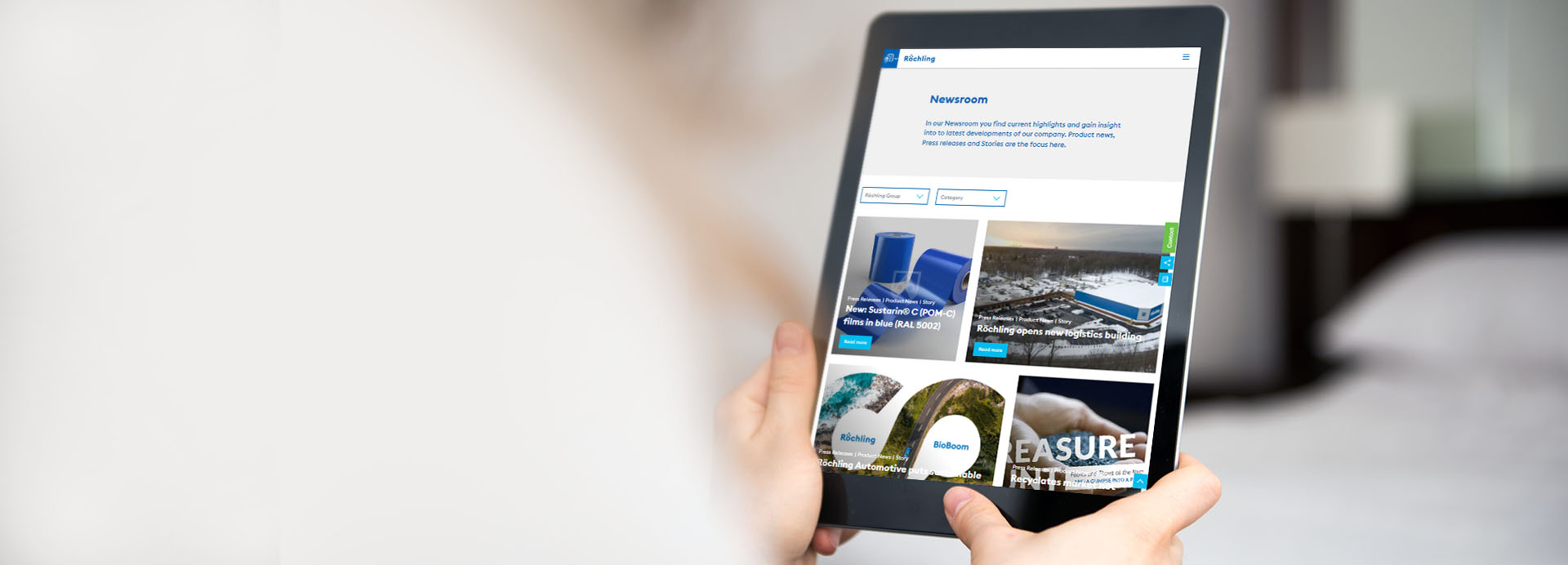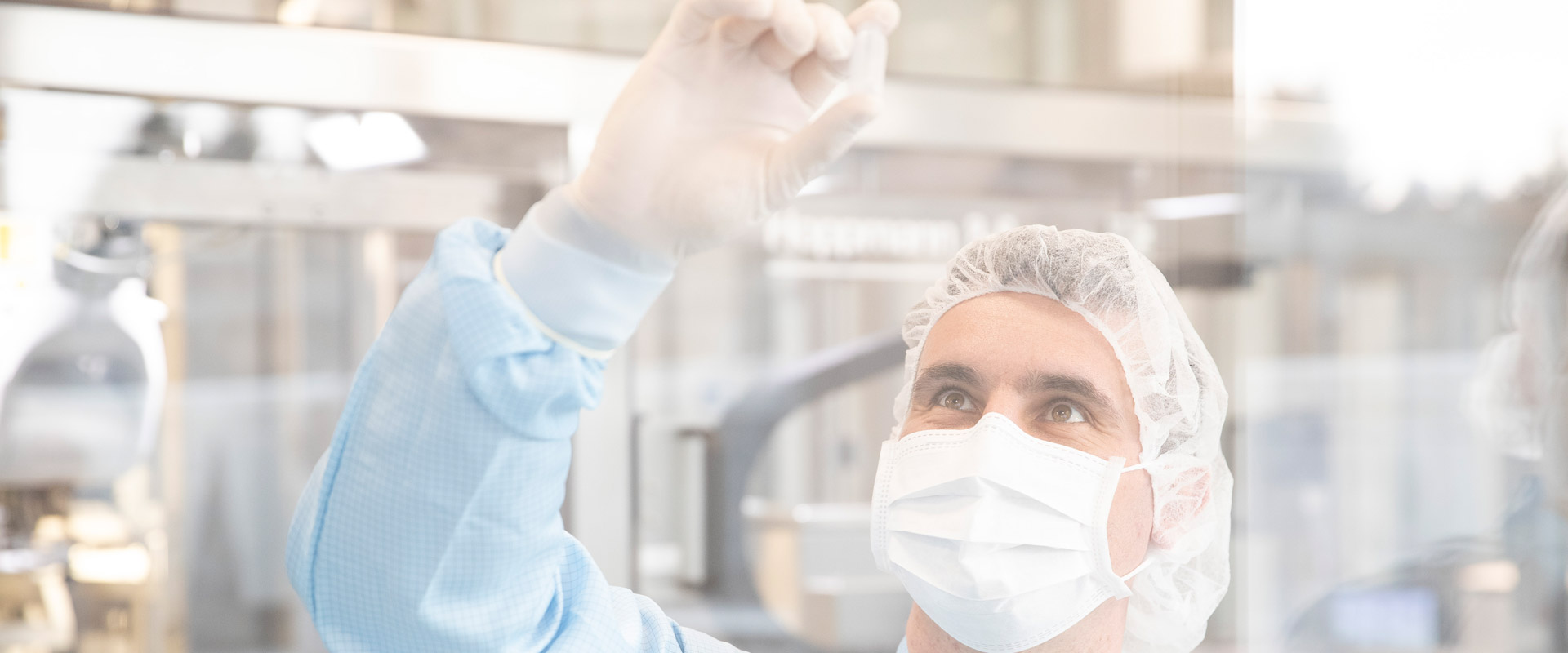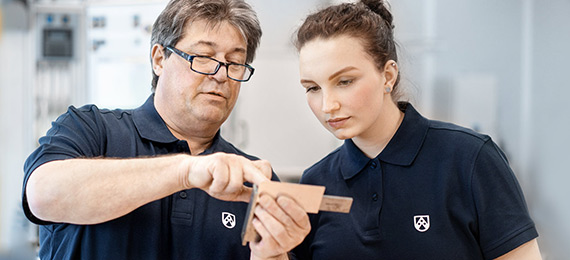A smart cap
MBA students from the EBS Business School pitch their ideas for intelligent pharmaceutical packaging for blind people
Intelligent pharmaceutical packaging with built-in electronics is no longer a vision from the future. Röchling Medical is participating in a project that is developing containers to make it easier for patients to take their medication. This involves thinking outside the box. That is exactly what Röchling Medical has done – as the sponsor of a start-up workshop for MBA students from the EBS Business School in Oestrich-Winkel, Germany.
How do patients take their medication?
To ensure that medical treatment is successful, it is extremely important that patients take their medication exactly as prescribed. Numerous studies show that following treatment instructions properly is hugely beneficial. However, investigations also show that lots of patients ignore their treatment plans – due to stubbornness, carelessness, or because they feel overwhelmed. Others find it difficult to open and close pharmaceutical packaging, for example patients who suffer from rheumatism and struggle to move their fingers, or people with poor eyesight or those who cannot see at all. This has brought the topic of smart packaging into focus. Intelligent packaging is likely to bring with it a range of benefits when it comes to taking medication.
What does networking mean?
Data will also play a significant role in intelligent packaging. The keyword is networking: packaging is connected to a smartphone or tablet, information is extracted from the packaging and package inserts, and this information is made available to the patient via a user-friendly app. It is also conceivable that data could be made available to the pharmaceutical manufacturers to help them improve their products – for example, if an inhaler always has to be shaken to make it work properly after repeated use due to a malfunction. Side effects could also be directly communicated to the manufacturer. The plan is for Röchling to support the analysis of the data generated in this way in the future in order to improve the products.

When is packaging considered intelligent?
What should intelligent packaging be able to achieve? It could remind the user when it is time to take their tablets, for example via their smartphone or directly through a built-in electronic unit in the packaging. It is also conceivable that an emergency doctor could be informed automatically if vital medication has not been removed from its packaging. Intelligent packaging also facilitates communication between the patient and the doctor, as the doctor can see at a glance how closely the patient has been adhering to treatment instructions. All in all, intelligent packaging adds value, is user-friendly and can make life easier for patients.

How is Röchling Medical involved?
Röchling Medical mainly manufactures primary packaging material made from a variety of plastics, such as bottles with screw caps for loose tablets or containers for infusions. When it comes to digitalization, Röchling is leading the way in product development to ensure it can continue being a competent partner when collaborating with customers. Röchling Medical has established an extensive network to purposefully and optimally address the topic of electronics in intelligent pharmaceutical packaging. The same goes for quality management: this also involves close exchange with institutes and laboratories in order to identify all the specific international standards that need to be complied with when integrating electronic components into pharmaceutical packaging.
What is Röchling Medical currently working on?
Intelligent packaging systems need to be accepted by patients, doctors, and manufacturers at the same time to ensure that they have a strong market potential. From the start of development through to series production, the practical use of the new packaging is analyzed using patient surveys and tests. Over the past few months, initial ideas and studies into new intelligent packaging have been assessed by Röchling Medical at Heidelberg University Hospital. Röchling Medical has also been presenting new ideas and solutions in focus group discussions with customers. "The intelligent components need to have a very robust design already during the development stage so that we can assemble them quickly and cost-effectively in large-scale series production conditions – just like we already do in our other assembly groups,” says Ralf Tröbs, Development Manager of the Business Unit Röchling Medical Europe. The built-in intelligence ranges from a chip to an acoustic or optical signal transmitter to end-to-end electronic systems. These components are developed together with partner companies and then produced and delivered to Röchling Medical. Röchling Medical is responsible for finalizing and dispatching the final product.
Who initiated the pitch project?
The start-up workshop including the pitch was an initiative of the Werte-Stiftung (Values Foundation). Using financial resources from industry and an extensive network, this foundation promotes public discourse about values and supports processes to build values. The “Futury” program is another Werte-Stiftung initiative. This involves companies – in this case Röchling Medical – being put in touch with talented individuals from universities. Together they work on developing new approaches and business models.
What was the pitch project about?
As the sponsor, Röchling Medical was involved in the pitching event on the topic of intelligent pharmaceutical packaging that was organized with 30 international students from the EBS Business School in Oestrich-Winkel, Germany. Röchling started by explaining the technical, pharmaceutical, and commercial requirements of the intelligent packaging to the MBA students, who all had a business or engineering background. The students then had two weeks to work on the topic in greater depth. At a second meeting, the six teams had 48 hours to develop their favorite concept and work on the associated business case. “When we received the request for the project, we primarily saw the opportunities it offered, and not the effort and expense that would go into it,” says Joachim Lehmann, Director Business Unit Medical Europe. This entrepreneurial spirit was rewarded with interesting and very diverse approaches to intelligent pharmaceutical packaging solutions.

Who won the pitch?
A jury selected one team as the winners at the end of the event. The students in this team came up with the idea of voice-controlled packaging that was supposed to help blind people take their medication. An electronic unit was integrated into the screw cap of the bottle. The students already had a prototype ready to present as part of their pitch, which included the commands for opening and closing the packaging being played on a laptop as a sound sequence.
What does the digitalization expert say?
Prof. Arne Buchwald is a junior professor for digital transformation and the scientific head of the Center for Digital Transformation at the EBS (European Business School) private university. Buchwald worked closely with the MBA students at the start-up workshop. The aim was to take well thought-out theories regarding the integration of digital platforms outside the lecture hall and transform them into business ideas. “We want to provide our students with an excellent education, and part of this is giving them the opportunity to work on real-world examples,” says Buchwald. This is why the topic of intelligent pharmaceutical packaging was particularly interesting, because it is very relevant to a lot of people. The professor is certain that there will be no issues with the packaging when it comes to data protection and security. Legal provisions, precisely defined access rights, secure data connections, fingerprint or password protection – there are many ways to ensure maximum security.
What does the physician think?
Prof. Walter E. Haefeli is the Medical Director of the Department of Clinical Pharmacology and Pharmacoepidemiology at Heidelberg University Hospital, Germany. His main area of interest is how to reduce errors, risks, drug interactions, and adverse events when taking medication, and how to maximize the success of treatment. What mistakes are made and when – which are crucial and which are not? What data sources are used to make decisions? How do we ensure that important information is reliably communicated? How can medicines be administered in a way that ensures that the active ingredient reaches the right area of the body? What should be included in a package insert – what does the patient need to know? Together with his team, Haefeli examines the effects and side effects of medication. “We use highly sensitive analytical resources at the hospital that are among the most sensitive in the world,” says the physician. In order to prevent harmful interactions or mistakes when writing prescriptions, Haefeli and his team have developed a software-supported medication information system that can be used to find information on medications and active ingredients within seconds as well as to access drug labels and package inserts. In terms of packaging, Haefeli believes it should primarily be the task of companies like Röchling Medical to develop uncomplicated and practical solutions that will simplify patients’ lives and increase safety. For some medications, this could be life-saving: “Many people who suffer a stroke were not taking their medication properly beforehand. Think of what we could gain if smart packaging were able to help with this problem.”











